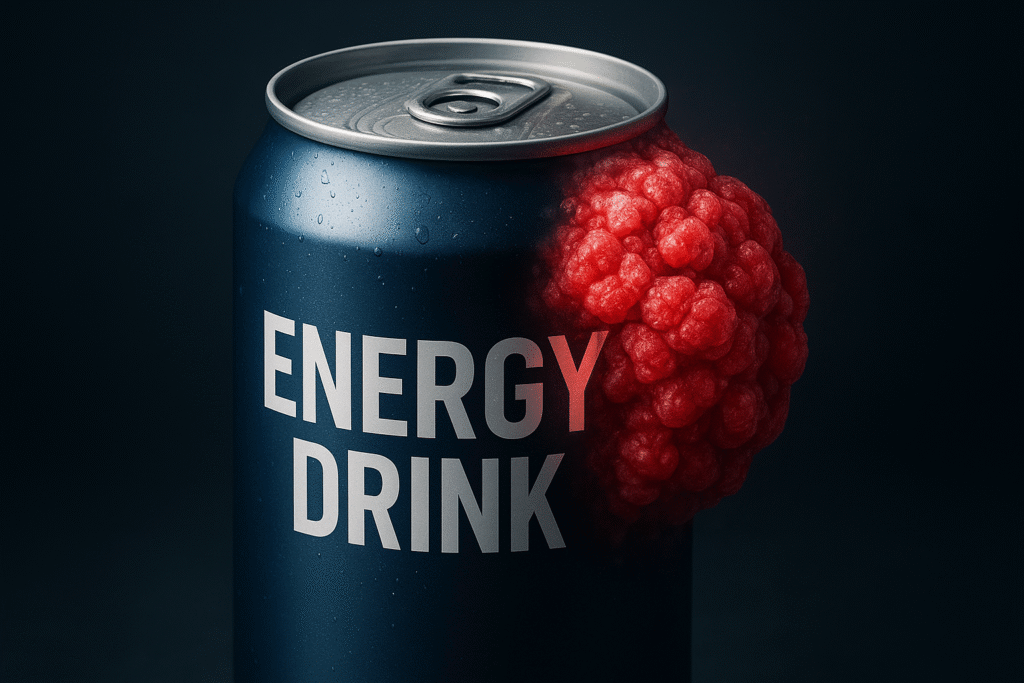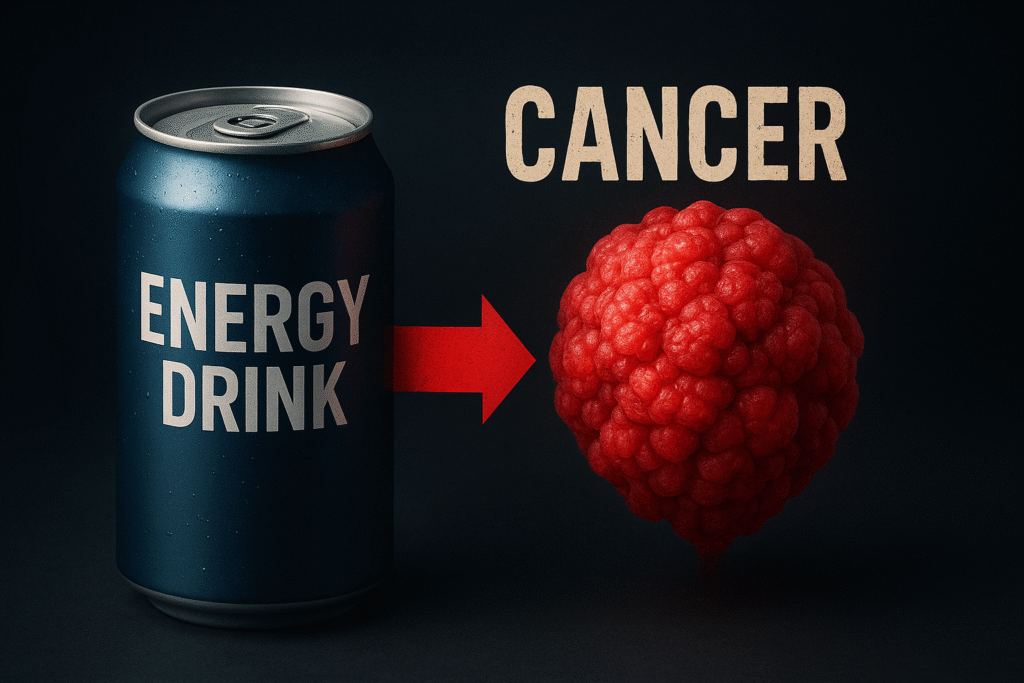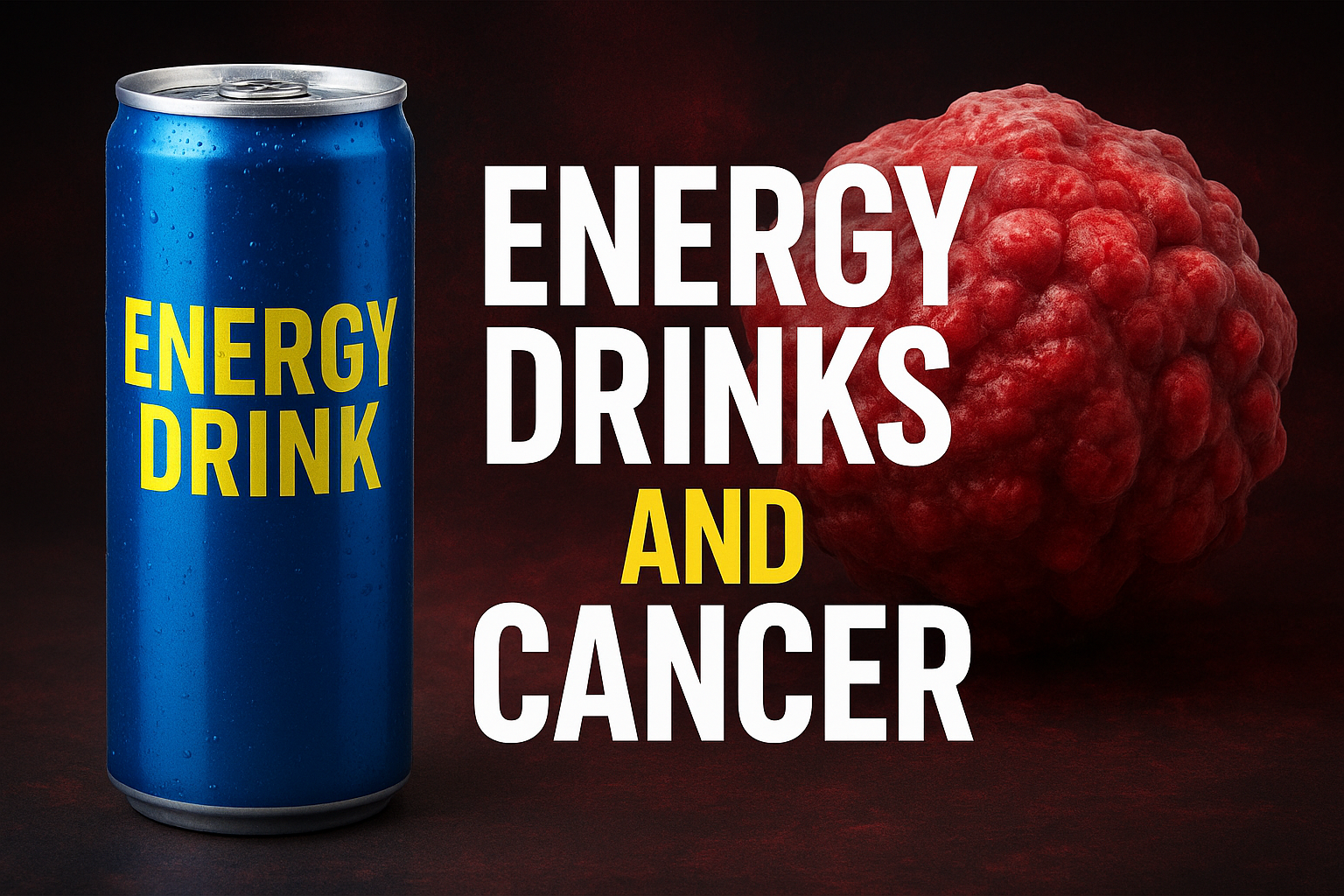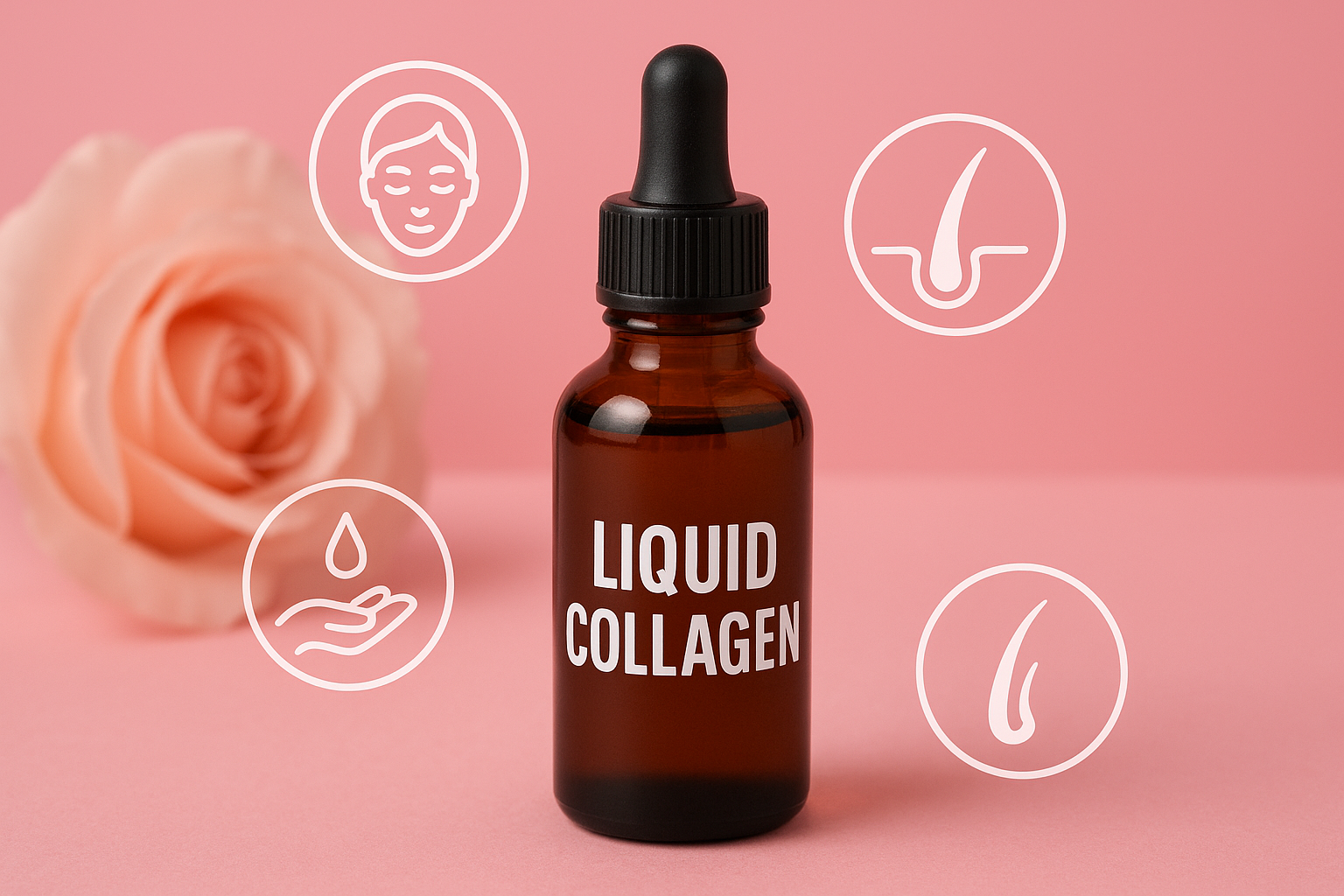Energy Drinks & Cancer
Energy Drinks Cancer: Energy drinks have become a staple for students, athletes, and working professionals looking for a quick energy boost. Marketed with promises of enhanced focus, stamina, and alertness, they contain caffeine, sugar, taurine, and other additives that stimulate the body and mind. Their global popularity has skyrocketed, but so too have concerns about their health implications.
Recently, research has sparked discussion about whether ingredients in these drinks—particularly taurine—could play a role in cancer progression, especially in leukemia. Some experimental studies have shown that taurine may act as a growth fuel for certain cancer cells, raising alarms among scientists and health advocates.
It’s crucial to emphasize that energy drinks are not proven to directly cause cancer in humans. Most findings come from animal models or laboratory research. Still, the evidence is strong enough to warrant caution, especially for individuals with blood cancers or heightened cancer risk. This article takes a deep dive into what the science actually says—covering cancer risks, taurine’s role, key studies, and the potential impact of other common energy drink ingredients.
Energy Drinks & Cancer Risk
So far, no scientific consensus proves that energy drinks cause cancer in healthy individuals. However, the concentration of certain compounds in these beverages raises questions. For example, taurine levels in energy drinks are far higher than what is typically consumed through diet. This matters because new evidence suggests that taurine may act as a metabolic driver for leukemia cells.
In leukemia, cancerous cells rely on their environment for nutrients. Taurine, when abundant, may act as an energy source that accelerates disease progression. This creates a potential indirect risk for patients with blood cancers.
On the other hand, for healthy populations, the cancer connection remains speculative, as long-term human studies are lacking. But energy drinks are already associated with other health concerns—including heart issues, metabolic strain, and sleep disruption. Therefore, while the average person may not face immediate cancer risks from drinking them, those with existing cancer diagnoses or blood disorders should consider limiting consumption.
Also Read: /keto-gummies/
Taurine in Energy Drinks & Cancer
Taurine is a naturally occurring amino acid found in meat, fish, and dairy products, and the body can produce it as well. It plays roles in muscle function, bile salt formation, nervous system health, and energy metabolism. Because of these benefits, taurine is added to energy drinks under the assumption that it supports alertness and stamina.
However, research in cancer biology has revealed another side to taurine. Studies show that leukemia cells cannot synthesize taurine on their own. Instead, they absorb taurine from their surroundings, including taurine derived from dietary or supplemental sources. Once absorbed, the cells use taurine to fuel glycolysis, a metabolic pathway that supplies quick energy for rapid cell growth.
This means that in the context of leukemia, taurine may unintentionally support the survival and spread of cancerous cells. While this does not prove taurine causes cancer, it highlights how high taurine intake—like that from energy drinks—could negatively influence disease outcomes in those already affected by certain cancers.

Taurine & Energy Drinks Cancer
Though taurine has long been considered safe, its high doses in energy drinks differ significantly from the levels found in a typical diet. Experimental findings suggest that these concentrated amounts may not be harmless in specific health scenarios.
Animal studies have demonstrated that leukemia-bearing mice supplemented with taurine experienced much faster disease progression compared to controls. Mortality rates increased approximately threefold. The biological explanation lies in taurine’s ability to enhance cellular energy production, which allows leukemia cells to thrive.
This does not mean everyone should avoid taurine, but it emphasizes the importance of context. For a healthy individual, taurine may have beneficial effects on muscle or neurological function. For someone with a blood cancer like leukemia, however, taurine could act as an unwanted accelerant. This makes energy drinks, which are one of the largest sources of synthetic taurine, particularly concerning for vulnerable populations.
Energy Drinks Cancer Risk Study
A major Nature study in 2025 explored the link between taurine and cancer progression. Researchers investigated how taurine influenced leukemia cell growth in both human cell samples and mouse models. They discovered that cells in the bone marrow produced taurine, which leukemia cells absorbed through a specialized transporter.
Blocking this taurine uptake slowed the growth of leukemia and extended survival rates in mice. On the other hand, adding taurine supplements worsened outcomes, with cancer cells multiplying more aggressively. These findings suggest that taurine may act as a critical nutrient for leukemia progression, making it an unexpected factor in disease dynamics.
Importantly, the researchers noted that this does not mean taurine is carcinogenic in itself. Instead, it highlights how nutrient availability can shape the behavior of existing cancers. This has implications for both cancer prevention strategies and future treatment approaches, such as therapies designed to block taurine transport into malignant cells.
Taurine & Energy Drinks Cancer Risk
Taurine’s potential role in cancer isn’t limited to leukemia. Other research suggests that taurine levels may also be linked to colorectal cancer, though this evidence is far less established. A recent study observed higher taurine levels in colorectal cancer patients, sparking interest in taurine as a diagnostic biomarker. Importantly, this does not mean taurine caused the cancer—it may simply reflect changes in metabolism that occur once the disease is present.
This broader perspective shows how cancer metabolism is complex, and nutrients like taurine can play very different roles depending on the context. For the average energy drink consumer, there is no evidence that taurine alone will trigger cancer. However, for those with specific cancers, particularly blood cancers, taurine-rich beverages may worsen outcomes.
As research continues, taurine’s dual identity—as both a naturally beneficial amino acid and a potential cancer fuel—remains an important scientific question. Until human trials provide clearer answers, moderation remains the safest approach.
Energy Drinks as Cancer-Causing?
Are energy drinks cancer-causing? The honest answer is: not directly, based on current evidence. No studies have proven that drinking them leads to cancer in healthy individuals. However, energy drinks are a cocktail of multiple compounds—high caffeine, sugars, synthetic taurine, and other additives—that interact in complex ways inside the body.
From a cancer perspective, the concern lies not in the drinks themselves but in specific ingredients. Taurine appears most relevant because of its role in leukemia progression. Sugar, while not directly carcinogenic, contributes to obesity and metabolic disease, both of which are recognized risk factors for certain cancers. Artificial colorings and preservatives have been investigated for potential long-term effects, though evidence remains inconclusive.
So while energy drinks cannot be labeled as direct cancer-causing products, their ingredients can contribute to environments that promote cancer risk factors. This distinction is critical: the drinks don’t “cause” cancer outright, but they may worsen conditions that allow cancers to develop or thrive.
Taurine Energy Drinks Cancer Study
Zooming in on the most detailed experimental research:
- Taurine levels in leukemia cells were found to be nearly twice as high as in normal cells.
- When taurine was supplemented in mice with leukemia, survival dropped sharply due to accelerated cancer growth.
- When taurine uptake was blocked, survival improved significantly.
- The transporter responsible, known as SLC6A6 (TauT), became a potential therapeutic target.
This demonstrates how a nutrient normally considered safe can have unintended consequences in certain contexts. The research highlights a larger truth about cancer biology: cancer cells often hijack normal nutrients and processes to fuel their survival.
In the case of energy drinks, this raises a warning flag for people at risk of or battling leukemia. While taurine remains harmless for most, for those individuals it may feed the very disease they are fighting. More clinical studies are needed, but the biological mechanism is compelling.
Energy Drinks Cancer Study
While taurine has received the most attention, energy drinks overall are being studied for long-term safety impacts. To date, no large-scale human epidemiological studies have linked energy drinks directly to cancer. However, scientists remain cautious because of three overlapping concerns:
- Additive effects of multiple stimulants – high doses of caffeine, sugar, and taurine may stress body systems.
- Microbiome changes – taurine can influence gut bacteria, which in turn affects colon health and possibly cancer risk.
- Metabolic strain – obesity and insulin resistance, linked to high sugar intake, are established cancer risk factors.
The lack of definitive data does not mean energy drinks are safe in unlimited quantities—it only means more research is needed. As with many lifestyle products, the absence of proof is not proof of absence. Future studies are expected to explore both the metabolic and cancer-related consequences of long-term energy drink consumption.

Energy Drinks Cancer Risk Ingredients
1. Taurine
Taurine is a naturally occurring amino acid involved in heart function, vision, and energy metabolism. In energy drinks, doses are much higher than natural dietary levels. While safe for most people, taurine can act as a metabolic fuel for leukemia cells, allowing them to grow faster. This has been shown in animal studies where taurine supplementation worsened cancer outcomes. In colorectal cancer, taurine has been observed at higher levels in patients, though causation has not been established. For those with existing blood cancers, taurine-rich drinks may pose risks and should be consumed cautiously.
2. Caffeine
Caffeine is the primary stimulant in energy drinks, known for improving focus and alertness. Its relationship to cancer is complex: some studies suggest it may lower the risk of certain cancers (like liver and colon), while excessive intake can stress the cardiovascular system. Importantly, there is no direct evidence linking caffeine to cancer development. However, caffeine can disrupt sleep, weaken the immune system over time, and raise stress hormones—all of which may indirectly influence cancer risk. Safe limits are considered around 400 mg per day, though energy drinks often push users close to or above this threshold.
3. Sugar
Many energy drinks contain high sugar levels, sometimes up to 50 grams per can. While sugar itself does not cause cancer, it drives obesity, insulin resistance, and chronic inflammation, all of which are strong cancer risk factors. Excess sugar intake creates an internal environment where cancer cells can thrive since they rely heavily on glucose for energy. Additionally, sugar contributes to metabolic syndrome, which is associated with higher risks of breast, pancreatic, and colorectal cancers. For individuals consuming energy drinks daily, the sugar burden poses significant long-term health risks that indirectly connect to cancer risk.
4. Artificial Sweeteners
Sugar-free energy drinks replace sugar with artificial sweeteners like aspartame, sucralose, or acesulfame potassium. These have been studied extensively for potential cancer risks. Regulatory agencies generally consider them safe, but some studies suggest high long-term intake could affect the gut microbiome or contribute to cancer in rare cases. For example, aspartame has been debated in relation to lymphoma and leukemia, though evidence remains inconclusive. The risk seems to lie more in chronic overconsumption rather than occasional use. While artificial sweeteners reduce calorie load, they may not fully eliminate cancer-related concerns in the long run.
5. Glucuronolactone
Glucuronolactone is a natural compound involved in detoxification processes in the liver. In energy drinks, it is believed to support endurance and reduce fatigue, though evidence for these effects is limited. From a cancer perspective, there is no strong research linking glucuronolactone to cancer either positively or negatively. Its safety profile is considered stable, but because it is often combined with other stimulants in high doses, its interaction effects are less understood. While not a proven carcinogen, questions remain about whether long-term, high-dose intake could stress liver detox pathways and indirectly influence cancer risks.
6. B-Vitamins
Energy drinks are often fortified with B-vitamins like B6, B12, niacin, and riboflavin. These vitamins support cellular energy production and are essential for normal metabolism. Generally, B-vitamins are safe and beneficial, but excessive supplementation has raised concerns. For instance, some studies suggest high levels of B6 and B12 may be linked to increased lung cancer risk in male smokers. The mechanism is not fully understood, but it may involve overstimulation of cell growth pathways. While unlikely to pose risks at standard doses, consuming multiple fortified energy drinks daily could push intake above safe limits.
7. Artificial Colors & Preservatives
To enhance visual appeal, energy drinks often include artificial colors and preservatives. Some dyes, such as Red 40 or Yellow 5, have been studied for potential carcinogenic effects. While most are considered safe at regulated doses, concerns persist about their long-term accumulation in the body. Preservatives like sodium benzoate, when combined with certain conditions, can form benzene, a known carcinogen. Although levels in drinks are typically low, repeated exposure raises questions. For consumers, these additives may not directly cause cancer but could contribute to cumulative risk factors when combined with other unhealthy habits.
Conclusion
To date, energy drinks are not proven to directly cause cancer, but their ingredients raise enough questions to merit careful consideration. The strongest evidence concerns taurine, which has been shown in preclinical studies to accelerate leukemia progression by fueling cancer cell metabolism. For individuals with blood cancers, taurine-heavy drinks may therefore pose additional risks. Other ingredients like sugar, artificial sweeteners, and certain vitamins also carry indirect cancer-related concerns, particularly through their role in obesity, metabolic dysfunction, or overstimulation of cell growth.
For the general population, moderate energy drink consumption is unlikely to cause cancer outright. However, for vulnerable groups—such as those with cancer diagnoses, family history of blood cancers, or metabolic health issues—it is wise to limit or avoid high-taurine and high-sugar formulations.
Ultimately, energy drinks should be consumed in moderation. They are not inherently toxic, but when combined with unhealthy lifestyles or preexisting conditions, they may amplify long-term cancer risks. Ongoing research will continue to clarify these links, but for now, the safest approach is awareness, moderation, and prioritizing healthier energy sources like balanced nutrition, hydration, and quality sleep.




